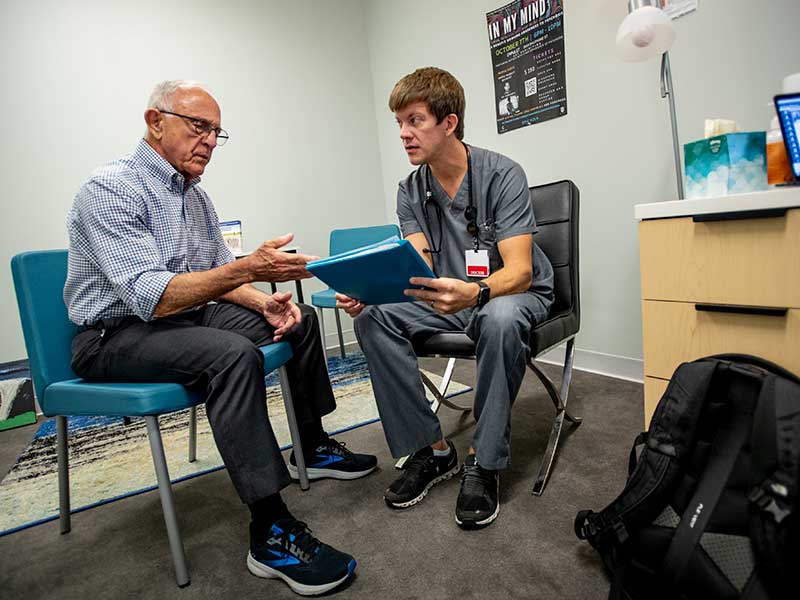
Dr. Stephen Milhollin (right), a fellow in the Tulane Addiction Medicine Fellowship program, confers with Dr. Ken Roy (left), medical director of addiction medicine at the Tulane School of Medicine. Roy and program faculty train physicians in the treatment, prevention and recovery of individuals with addiction. (Photo by Paula Burch-Celentano)
“It’s an uphill climb to educate people that addiction is one disease,” says Dr. Ken Roy, associate professor of psychiatry at the School of Medicine and program director of the Tulane Addiction Medicine Fellowship.
Through the Tulane Addiction Medicine Fellowship, offered by the Department of Psychiatry and Behavioral Sciences at the School of Medicine, Roy and program faculty train physicians in the treatment, prevention and recovery of individuals with addiction. The one-year fellowship is open to any physician who is board certified or board eligible in any American Board of Medical Specialties primary specialty, such as Family Medicine, Internal Medicine, Obstetrics, etc.
With addiction being the third preventable cause of disability and premature death in the United States, Roy’s goal is for Tulane to be a leader in addiction medicine.
“So much of our training is to help trainees understand they don’t fix people, they follow people, just like they do with other chronic medical illnesses,” Roy said.
Roy says that development of addiction treatment has been siloed or isolated and aims for the program to counteract that.
“Our intention is to develop training across different modalities so that the completing fellows will be competent and qualified to move into any part of the spectrum of care and provide services to any population they choose to serve.”
Along with training to treat patients with different manifestations of addiction, physicians learn to treat patients of varying socioeconomic status, education levels and access to resources. A main element of the program is participation in a continuity clinic in which fellows inherit patients from the previous fellow. They also treat any new patients seeking treatment.
“We try to deal with all those barriers to access and try and find avenues to connect people that need treatment to treatment that will accept them,” Roy said.
The fellowship received accreditation by the Accreditation Council for Graduate Medical Education in 2018. Roy joined as program director in January 2020, and since then, nine physicians have completed their fellowships.
“With the help of staff and the effort of the trainees and co-faculty, we have grown significantly,” Roy said.
Currently, four physicians are enrolled, and completion of the fellowship leads to board certification in addiction medicine.
The program has nine training sites and fellows train at more than one site every week on quarterly rotations. “By the time they finish, every fellow will have experienced every training site for three months,” Roy said.
Visit the Tulane Addiction Medicine Fellowship website and School of Medicine YouTube page for more information.
Original source can be found here.


 Alerts Sign-up
Alerts Sign-up